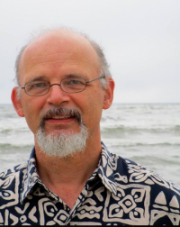Livestream Recording Link for Lecture: https://youtu.be/ZTFkRTUALIc
Livestream Recording Link for Panel Discussion: https://youtu.be/3OEXx7FOgaY
With guest speaker Simon Richter, Class of 1942 Endowed Term Professor and Interim Chair of the Department of Germanic Languages and Literatures at the University of Pennsylvania.

Lecture, November 13, 2018, 5:00-6:30 pm Dauer 219 (Ruth McQuown Room): “Getting Creative: Translation and Etymology as Cultural Narratives of Sustainability and Resilience in Germany, Israel, the Netherlands & Indonesia.”
In his lecture, Professor Simon presented four case studies that show how the translation of two terms, sustainability and resilience, can reveal the distinctive cultural and intercultural stakes of communities as they respond to the climate crisis. Sustainability made its way onto the world’s stage abruptly with the publication of what is known as the Brundtland report, a widely-disseminated UN document, which introduced the concept of sustainable development. Insofar as nations and language communities operate within UN frameworks and wish to involve their citizenry, corresponding words in the home language were required. Through strategic translation and creative etymology, language communities had a unique opportunity to specify the cultural narrative that underwrites their commitment or approach to sustainability. Professor Simon’s presentation begins in the German Enlightenment with the story of Nachhaltigkeit, and moves on to consider the linguistic situation in Israel, Indonesia, and the Netherlands.
Introduction by Will Hasty (German/LLC; Codirector, Center for Medieval and Early Modern Studies).
Panel Discussion, November 14, 2018, Dauer 215 (12:00-1:30 pm): “Polder-Geist: Dutch Responses to Rising Sea Levels and Sinking Cities in the Netherlands, the United States and Asia.”
Coastal cities around the world are already contending with the effects of sea level rise. For many, the problems are exacerbated by subsidence. Cities are sinking and seas are rising. Hundreds of millions of people will be affected. Enter the Netherlands. Building on proud traditions of coastal defense, land reclamation, and water management, the Dutch avidly pursue what they call their “international water ambition.” In New York, Miami, Houston, Ho Chi Minh City, Jakarta, Dhaka, and many more, you will find the Dutch government and Dutch engineering and design companies promoting the Dutch approach. Dutch design slogans capture the range of their ambition: Rebuild by Design, Building with Nature, the Blue Revolution, the Floating City, Room for the River. The Dutch are intent on turning problems into opportunities. In this workshop, we will explore the intercultural aspects of the Dutch international water ambition in several case studies.
Including discussion with Terry Harpold (English), Angela Lindner (Environmental Engineering Sciences), Chris Silver (College of Design, Construction & Planning), and Les Thiele (Political Science).
Introduction by Barbara Mennel (English and German/LLC; Director, Center for Humanities and the Public Sphere). Moderated by Will Hasty (German/LLC; Codirector, Center for Medieval and Early Modern Studies).
The Global-Cultural Sustainability Symposia are supported by the Waldo W. Neikirk Fund, the University of Florida International Center, the Department of Languages, Literatures, and Cultures, the Center for Medieval and Early Modern Studies, and Imagining Climate Change.
Discussion
Do you have any comments about this topic? Fill out the form below to join the discussion.
Comments
Hi,
We'd like to introduce to you our explainer video service, which we feel can benefit your site songs.clas.ufl.edu.
Check out some of our existing videos here:
https://www.youtube.com/watch?v=zvGF7uRfH04
https://www.youtube.com/watch?v=cZPsp217Iik
https://www.youtube.com/watch?v=JHfnqS2zpU8
All of our videos are in a similar animated format as the above examples, and we have voice over artists with US/UK/Australian/Canadian accents.
We can also produce voice overs in languages other than English.
They can show a solution to a problem or simply promote one of your products or services. They are concise, can be uploaded to video sites such as YouTube, and can be embedded into your website or featured on landing pages.
Our prices are as follows depending on video length:
Up to 1 minute = $259
1-2 minutes = $339
2-3 minutes = $439
*All prices above are in USD and include an engaging, captivating video with full script and voice-over.
If this is something you would like to discuss further, don't hesitate to reply.
Kind Regards,
Katy
ExplainerVideos4u.net
September 25, 2022
Hello, Professor Richter.
I found your lecture very interesting. I am a student of linguistics, and I am currently taking a course on the German language. I was interested in your discussion about sustainability, and thought it was interesting that I too did not know the word in any of the foreign languages I have studied.
Do you believe if, for example, the word for sustainability in German (nachhaltigkeit) had been different, or had a slightly different meaning, then the perspective of modern Germans towards sustainability would have been altered?
For example, if the meaning of "nachhaltigkeit" had been along the lines of changing, adapting, or creating instead of preserving and holding for the future, then the sustainability culture in Germany could have been different?
Thank you
December 1, 2022